Catalogue > Liste par artiste
Parcourez la liste complète des artistes présentés dans le cadre des Rencontres Internationales depuis 2004. Utilisez le filtre alphabétique pour affiner vos recherches.
Lukas Marxt
Catalogue : 2013Nella Fantasia | Doc. expérimental | hdv | couleur | 55:0 | Autriche, Norvège | 2012
Lukas Marxt
Nella Fantasia
Doc. expérimental | hdv | couleur | 55:0 | Autriche, Norvège | 2012
Nella Fantasia was created in December 2011 on the offshore oil rig Snorre A situated in the middle of the North Sea off the coast of Norway. After successfully passing a number of health tests and safety trainings, Lukas Marxt travelled to the platform and spent around 10 days collecting visual and acoustic impressions amid the loneliness of wind storms and huge waves. The result is a visual description of the oil rig microcosm which does not focus on technical processes and ongoing work on the platform but, instead, attempts to create a location which excludes obvious associations of the surroundings such as corridors, curtains, the horizon, the lapping of waves and a melancholic sigh at the end of a shift. The quiet and long shots of the film form a sort of inner monologue which the viewer can feel and experience - disconnecting people and machine. "Nella Fantasia" lasts roughly 55 minutes and is part documentary and part experimental art film.
Lukas Marxt lebt und arbeitet in Köln, Leipzig und Graz, er wurde 1983 in Österreich geboren, studierte von 2003 bis 2007 an der Kunstuniversität Linz. 2007/2008 studierte er an der Faculdade de Belas Artes in Lissabon. 2009 realisierte er sein Diplom im Studienzweig ?Audiovisuelle Gestaltung? an der Kunstuniversität Linz. Zwischen 2009 und 2012 absolvierte er den postgradualen Studiengang an der Kunsthochschule für Medien Köln. Seit 2012 ist Lukas Marxt als freischaffender Künstler tätig.
Lukas Marxt, Vanja Smiljanic
Catalogue : 2026AMONG THE PALMS THE BOMB or: Looking for reflections in the toxic field of plenty | Doc. expérimental | mov | couleur | 85:0 | Autriche, Allemagne | 2024
Lukas Marxt, Vanja Smiljanic
AMONG THE PALMS THE BOMB or: Looking for reflections in the toxic field of plenty
Doc. expérimental | mov | couleur | 85:0 | Autriche, Allemagne | 2024
La mer de Salton, dans le sud de la Californie, est un écosystème unique. En seulement quatre ans, son niveau d’eau a baissé d’un bon demi-mètre ; avec une profondeur maximale de dix mètres, on peut aisément calculer le moment où elle devrait se retrouver à sec. Et cela ne concerne encore que l’aspect global, lié au réchauffement climatique et aux modifications du climat local. La Salton Sea est également singulière parce que les États-Unis y ont testé de nombreuses bombes atomiques durant les phases finales de la Seconde Guerre mondiale et de la guerre froide — d’abord en préparation des bombardements d’Hiroshima et de Nagasaki, puis comme entraînement pour des missions qui, fort heureusement, n’ont jamais eu lieu. Dans AMONG THE PALMS THE BOMB, Lukas Marxt et Vanja Smiljani? s’intéressent particulièrement à cet aspect de l’histoire régionale. Le film commence dans l’Utah, d’où décollaient les avions avant de trouver leur cible dans la zone supposément isolée autour de la Salton Sea. À Wendover, un musée expose notamment des maquettes de « Fat Man » et « Little Boy », les deux seules bombes atomiques jamais utilisées en temps de guerre, ainsi qu’une fosse de chargement où les avions étaient équipés — un dispositif auquel Marxt a d’ailleurs consacré un court film en 2019. Depuis de nombreuses années, il étudie la situation du sud de la Californie, que l’on peut, à bien des égards, qualifier d’extrême. L’agriculture intensive, fondée de manière radicale sur les monocultures, a tout submergé. Marxt et Smiljani? découvrent qu’une alliance s’est formée dans ce contexte : des travailleurs agricoles sans papiers venus d’Amérique latine trouvent refuge dans les réserves amérindiennes. AMONG THE PALMS THE BOMB donne la parole à des experts locaux qui éclairent le paysage et son histoire ; le réalisateur recherche également des voix discordantes, notamment au sein de la tribu des Torres Martinez Desert Cahuilla Indians, victimes d’un génocide au XIX? siècle. Leurs descendants se souviennent du temps où nombre de plantes aux pouvoirs curatifs — et indissociables d’une vie en symbiose avec la nature — poussaient autour des eaux salées de la Salton Sea. Aujourd’hui, la région appartient aux buissons salins, et sous la surface sommeille l’uranium d’une guerre froide sur le point de ressurgir. « Des temps effrayants », dit quelqu’un. (Bert Rebhandl)
Lukas Marxt (*1983, Autriche) est un artiste et cinéaste vivant et travaillant entre Cologne et Graz. Son intérêt pour le dialogue entre l’existence humaine et géologique, ainsi que pour l’impact de l’activité humaine sur la nature, s’est d’abord développé au cours de ses études de géographie et de sciences environnementales à l’Université de Graz, avant de se poursuivre dans ses études audiovisuelles à l’Université d’art de Linz. Il a obtenu un MFA à la Kunsthochschule für Medien Köln et a suivi le programme postgrade de l’Académie des beaux-arts de Leipzig. Marxt partage sa recherche aussi bien dans le champ des arts visuels que dans le contexte cinématographique. Ses œuvres ont été présentées dans de nombreuses expositions personnelles et collectives, parmi lesquelles le Torrance Art Museum (Los Angeles, 2018), la Biennale de la peinture au Museum Dhondt-Dhaenens (Belgique, 2018) et le Museum of Modern and Contemporary Art de Rijeka (Croatie, 2018). Ses films ont été montrés dans de nombreux festivals internationaux, notamment la Berlinale (Allemagne, 2017 et 2018), Curtas Vila do Conde (Portugal, 2018), ainsi qu’au Festival international du film de Gijón, où il a reçu le prix Principado de Asturias du meilleur court métrage (Espagne, 2018). Depuis 2017, Marxt a passé de longues périodes dans le sud de la Californie, où il étudie les structures écologiques et sociopolitiques entourant la Salton Sea. Vanja Smiljani? (Belgrade, 1986) est une artiste visuelle et performeuse vivant et travaillant entre Lisbonne et Cologne. Elle a suivi le programme post-master en recherche artistique à A.pass, Bruxelles (2015), a obtenu un MFA au Dutch Art Institute (DAI), Arnhem (2012), ainsi qu’à la Kunsthochschule für Medien Köln (2019), et est diplômée en arts plastiques de la Faculdade de Belas Artes de Lisboa (2009). Dans sa pratique, elle recourt souvent au modèle de la performance-conférence pour relier des univers fictifs et expérientiels, mêlant dispositifs techniques, diagrammes et sculptures sci-fi povera. En connectant des systèmes de réalité a priori incomparables, le travail de Vanja met en lumière la fabrication des idéologies comme régimes aliénés, en utilisant son propre corps comme vecteur de narration, oscillant fréquemment entre les positions d’oracle et de conteuse.
Masbedo
Catalogue : 2025Pantelleria | Vidéo | digital | couleur | 20:0 | Italie | 2022
Masbedo
Pantelleria
Vidéo | digital | couleur | 20:0 | Italie | 2022
Between 9 May and 11 June 1943, the island of Pantelleria was violently bombarded by the Allied troops in the first operation to reconquer Italian soil. Residents recall that, after the surrender, some of the buildings were blown up for the cameras of a propaganda combat film. Pantelleria traces the memories of this event in the local collective consciousness and looks at the contemporary implications of an episode that took place in the shadow of official history. Through a two-years long participatory process with the residents, the film explores the tension between the truth and its ideological distortion, and between the reality of the bombs and their telling through images. The Nervi hangar, a symbol of Mussolini’s militarisation of the island, is now shown empty and inhabited by a magical animal presence. Extracts from the combat film are projected onto the buildings of today’s Pantelleria, while the camera travels through the bunkers dug by the Italian army. The voiceover, written and read by writer Giorgio Vasta, gives expressive form to the island’s stories, while the sound by GUP Alcaro and Davide Tomat distorts the recordings of the local orchestra Spata, finding in dance music a space for the reactivation of the past, and liberation in the present.
MASBEDO is an artistic duo formed by Nicolò Massazza and Iacopo Bedogni. They have been working together since 1999 and they currently live in Milan and Piacenza (Italy). Different artistic languages such as video, installation, cinema, performance, theater, and sound design coexist in their work. They are interested in emotional and intense narratives that delve into the depths of human relationships and the complex subjectivity of the contemporary individual. They have identified the relationship between cinema and art as a preferred area of investigation, which they approach with an attentive gaze to both socio-anthropological elements and the most intimate and poetic ones. MASBEDO’s works have been exhibited in international institutions such as: Manifesta 15 Barcelona; Centre Pompidou-Metz; CCCB Centre de Cultura Contemporània de Barcelona; Fondazione ICA Milan; MAMM Multimedia Art Museum Moscow; Manifesta12 Palermo; Hong Kong Arts Centre; Fondazione Merz; Leopold Museum Wien; MAXXI Rome; Centre Pompidou/Forum des Images Paris. Among others, their short and feature films have been shown at: Venice International Film Festival; Locarno Film Festival; CPH:DOX; FIFA – Festival International du Film sur l’Art Montréal; Villa Medici Film Festival Rome; Sharjah Film Platform; Walter Reade Theater, Film Society of Lincoln Center, New York; Lo schermo dell’arte, Florence, IFFR-International Film Festival Rotterdam.
Masbedo
Catalogue : 2021Condivisione di un ricordo | Vidéo | mp4 | couleur | 13:13 | Italie | 2020
Masbedo
Condivisione di un ricordo
Vidéo | mp4 | couleur | 13:13 | Italie | 2020
La grande projection vidéo mise en place fait écho au documentaire "Condivisione di un ricordo": cette œuvre présente l'opération qui s’est déroulée à Bergame et dans les communes du Val Seriana pendant l'été, et au cours de laquelle de nombreuses affiches reproduisant le tableau de Pellizza ont été exposées, grâce à la participation de personnes rencontrées par les artistes.
Les deux artistes travaillent ensemble depuis 1999, se concentrant sur l'art vidéo et les installations. Ils s'expriment à travers le langage vidéo, et sous différentes formes telles que la performance, le théâtre, l'installation, la photographie et récemment le cinéma. En Italie, ils sont reconnus parmi les principaux artistes vidéo et innovateurs en art contemporain. Leur recherche artistique s'est concentrée sur le thème de l'incommunicabilité, soulignant le paradoxe de notre société de communication. Cela les a amenés à produire des pièces très intimes, ainsi que des œuvres à caractère plus anthropologique, social et politique. Ils s'efforcent d'impliquer leur public, en utilisant les images en mouvement comme une installation immersive. MASBEDO a également exploré la vidéo-performance, afin d'impliquer son public dans l'espace créatif et dans les gestes créés par la vidéo elle-même.
Catalogue : 2018Fragile | Vidéo | hdv | couleur | 7:46 | Italie | 2016
Masbedo
Fragile
Vidéo | hdv | couleur | 7:46 | Italie | 2016
The video, Fragile (2016) produced by the Museo Reale Galleria Sabauda in Turin, staged a young man`s visit to the gallery halls in the presence of a peacock. Walking among the masterpieces of antiquity, symbolic objects of archetypal beauty, the presence of the peacock underlines the essential precariousness of the living animal and its impairment that renders it inapt to represent its nature. The image is highly suggestive because it’s made even more dramatic due to the emptiness of the halls, facing the perpetual immobility of the painted characters. The main theme of these works is the concept of "cure": the old animal, object of the care of its master, is a metaphor of the combination of a faded vanity and the eternal journey into beauty, a trip defined by Rainer Maria Rilke as "the tremendous at its beginning." The fragility of art, to which the title of the work refers to, engages the observer`s gaze and warns of the necessity to provide protection of art and cultural heritage. A metaphor that reminds us of the need to preserve and care for our artistic and cultural heritage as a form of resistance to time and carelessness of man. In 2018, when Europe dedicates itself to Cultural Heritage, encouraging public institutions to celebrate their relevance and value for the cultural development of society, the artistic discourse by Masbedo is consistently aligned with this theme, showing how contemporary artists relate themselves with the art of the past and how history of art can be a source of inspiration for new generations.
MASBEDO (Nicolò Massazza, 1973, Milan - Iacopo Bedogni, 1970, Sarzana) started their journey in 1999, focusing on the potential of video art and video installation. Developed around the theme of incommunicability in contemporary society, their research has produced both, intimate works and more socio-political and anthropological-cultural productions. Their aesthetic approach presents pictorial aspects and the realization of their videos pursues the goal of involving the viewer in the space created by the moving images through immersive installations. Their work, in fact, is a synthesis of theatre, performance, space, architecture and video / cinema. They have been included in solo shows in important museums and foundations both in Italy and abroad, as well as in various film festivals, and their works are included in relevant private and public collections: MART, Rovereto, Italy; Fondazione Merz in Turin, Italy; GAM - Galleria d’Arte Moderna in Turin, Italy; MACRO - Museo di Arte Contemporanea in Rome, Italy; DA2 - Centro de Arte Contemporáneo, Salamanca, Spain; CAAM Centro Atlántico de Arte Moderna, Las Palmas, Spain; CAIRN Centre d’Art, Digne-les-bains, France; Tel Aviv Museum of Art, Israel.
Catalogue : 20152.59 | Vidéo | hdv | couleur | 3:0 | Italie | 2013
Masbedo
2.59
Vidéo | hdv | couleur | 3:0 | Italie | 2013
A small dramatic gesture cancels any possible remains of hope in 2.59 (2014). A dental drill scrapes the grooves of a vinyl record playing John Lennon’s Imagine– whose playing time is actually two minutes and 59 seconds – as the needle ultimately and stridently squeaks, while snowflakes start to fall. Dreams are no longer possible, as our society has completely denied them.
MASBEDO are Nicolò Massazza (1973) and Iacopo Bedogni (1970). They live and work in Milan. The two artists have worked together since 1999. They express themselves through the language of video, in different forms such as performance, theater, installation, photography and recently cinema. In Italy they are recognized among the most important video artists and innovators in the field of contemporary art: thanks to their unique feature of re-union of different arts: the multiplicity of languages becomes a single chorus. In fall 2014 a major solo exhibition will be showed at the Fondazione Merz, anticipated by the presentation of their first film The Lack at the Venice Film Festival. In 2013 the Leopold Museum Wien presented the video-installation “Ash” and they exhibited in Pinacoteca Nazionale Bologna a solo show with videos and a video performance. In 2012 they held video performances in several museums of contemporary art and in particular locations such as the Italian Embassy in Berlin during 7th Art Biennial. With the very special participation of Fanny Ardant they present at Teatro Strehler in Milan and Teatro Palladium in Rome an audio video performance from Le Remède de Fortune of Guillaume de Machaut. They participate with the doc-film Tralalà at the 69th Venice Film Festival and at the Reykjavik International Film Festival. Other very important shows in their career are Art Basel Unlimited, MAXXI and MACRO Museum in Rome and the 53. Venice Biennial Of Art. Other museums such the Center for Contemporary Art Uajzdowsky Castle in Warsaw, the CCCB Centro de Cultura Contemporanea in Barcelona, the DA2 Museum in Salamanca, Castello di Rivoli Museo d’arte contemporanea in Turin, the OK Offenes Kulturhaus in Linz, the Tel Aviv Art Museum and the Centro Atlantico de Arte Moderno in Las Palmas de Gran Canaria hosted in the past years their artworks. Other Film Festivals in their career: Bellaria, Tremblay en France, Novi Sad, United Nation World Forum in Rio De Janeiro, Locarno, Rome, Istanbul, Lisbon, Athens, Miami and Trieste. They have always participated with video-art projects. They worked with French writer Michelle Houellebecq with which they write The world Is Not A Panorama, a video art movie with the precious collaboration with Oscar Winning actress Juliette Binoche and exhibit the premiere at the Gran Palais, Paris.
Monika Maslon
Catalogue : 2023Control Negative | VR expérimental | 0 | couleur | 40:0 | Pologne | 2022
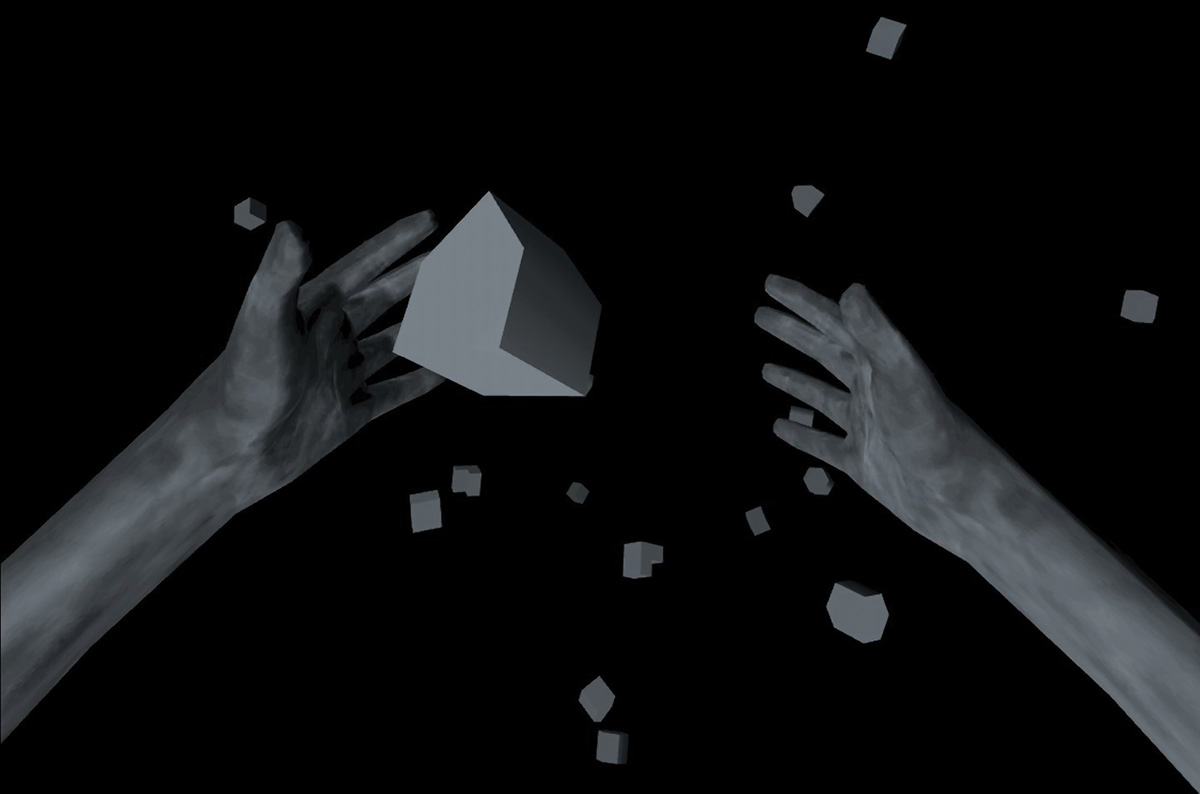
Monika Maslon
Control Negative
VR expérimental | 0 | couleur | 40:0 | Pologne | 2022
The CONTROL NEGATIVE experience is an exercise in a loss. Using VR technology, author Monika Mas?o? situates the viewer in an emotional state where frustration, helplessness, anger, and sadness are used to reveal basic human assumptions, including the illusory conviction of being fully in control of one's own life. The unreal world of the experience — a negative version of the real world — is a training space where you can better understand yourself and your emotions. The user is guided through seven chapters, which gradually move from physical activity to contemplation.
Dr. Monika Maslon (born 1982) - visual artist and art educator. She graduated from the Academy of Fine Arts in ?ód? and Ph.D. studies at the Film School in ?ód?, where she completed her Ph.D. thesis entitled “Do zobaczenia” (See you), under the supervision of Prof. Józef Robakowski. She is a lecturer at the University of Leipzig and the Maria Grzegorzewska University in Warsaw where she conducts classes with the students of the department of Arts education in fine arts. In 2014 she stayed at an artistic residence in Singapore, where she made an artistic project called “Comfort of Long-Distance Perceiving”. In 2016 she implemented the project “Template - a tool to learn how to use an image”, as a part of a scholarship awarded by the Ministry of Culture and National Heritage. The scope of her art activities is manifested mainly through realizations based on audiovisual material. She participated in numerous exhibitions and shows. She is the author of the VR experience - CONTROL NEGATIVE.
Valérie Massadian
Catalogue : 2012Nana | Fiction expérimentale | hdv | couleur | 68:0 | France | 2011
Valérie Massadian
Nana
Fiction expérimentale | hdv | couleur | 68:0 | France | 2011
...
It's through photography, and notably her collaboration with Nan Goldin, that Valerie Massadian came to image-making,Creating slide- show screenings (The Link, Mary Go Round, Journal de Bord), exhibited in Tokyo, London and Porto. What she has retained from photography is its freedom and the rigor of frontal contact. She has taken this same approach, committing to a project from concept to completion, in her collaborations with several film directors. From there came the need of her own film, NANA, which won the Price for Best First Feature Film at the Locarno Film Festival 2011, as well as the Price for Best International Feature Film at the Festival Internacional de Ciné de Valdivia.
Valérie Massadian
Catalogue : 2014America | | | | 6:57 | France | 0
Valérie Massadian
America
| | | 6:57 | France | 0
One Place One Boy One Day One Shot One Wheel of Film
Guy Massaux
Catalogue : 2020La selva oscura | Fiction expérimentale | 4k | couleur | 19:0 | Belgique, Italie | 2018
Guy Massaux
La selva oscura
Fiction expérimentale | 4k | couleur | 19:0 | Belgique, Italie | 2018
La Selva oscura (La forêt obscure) film/vidéo, texte de Dante Alighieri, La Comédie, L’Enfer, Chant treizième (XIII) Préambule: Dans la forêt des suicidés, Dante et Virgile croisent deux formes humaines qui fuient devant eux, arrachant tout sur leur passage et brutalisant ainsi elles-mêmes leur chair jusqu’à ce que des chiennes faméliques (Harpyes) les rejoignent et les dépècent. Tel est le châtiment de ceux qui ont péché contre eux-mêmes par dissipation. Synopsis: Par une nuit obscure, A. et D. progressent, séparément, dans une forêt où nul sentier n’indique le chemin à suivre, où aucune issue ne se présente à eux. Ils se sont égarés, la forêt les retient. Ils surgissent de l’obscurité, débusqués par les éclairages qui les aveuglent. Un face-à-face s’installe entre eux et la forêt, à la présence des arbres répondent leurs propres regards et voix. A. s’est levé, D. de même, résonnent en eux les aboiements d’une meute de chiens qui progressivement se rapproche. Une course-poursuite est engagée où toute issue leur sera fatale.
Guy Massaux est artiste visuel, curateur d’exposition, professeur d’art à l’Académie des beaux-arts de Bruxelles. Après avoir consacré son travail d’artiste principalement à la peinture, il oriente, depuis plusieurs années, ses préoccupations de création autour de l’image en mouvement par l’écriture cinématographique, notamment à travers des dispositifs de vidéo-installations. Il a réalisé plusieurs courts métrages en langue italienne, La Selva Oscura (2018), Il Rifugio (2014) et "B.", film en cours de post-production (2020). Il partage ses principales activités et son emploi du temps entre l’Italie et la Belgique. Il collabore régulièrement avec Mirco Mencacci ingénieur du son. Créateur des univers sonores de films italiens tels que « Le Regard de Michel Ange (Lo Sguardo di Michelangelo) » de Michelangelo Antonioni, « Nos meilleures années (La Meglio gioventu)» de Marco Tullio Giordana ou encore «La Fenêtre d’en face» (Facing Windows) de Ferzan Ozpetec. Pour ses créations, il travaille sur une nouvelle manière de diffuser le son et développe le système du « son sphérique », utilisé pour la première fois dans le film « Le Regard de Michel Ange ».
Agnieszka Mastalerz
Catalogue : 2025Nodes | Vidéo | digital | noir et blanc | 3:16 | Pologne | 2023
Agnieszka Mastalerz
Nodes
Vidéo | digital | noir et blanc | 3:16 | Pologne | 2023
Nodes is a project analyzing spells as an example of control over another being. I focused on the violence of persuading somebody to fall in love. I have been considering casting a spell as an influential but not direct act for which specific tools or gestures might be needed. I chose orchids whose roots were used to influence another person, both when it comes to feelings and sexual activity. In the areas of today’s Poland and Italy, dried wild orchid roots were hidden under somebody’s clothes, or an orchid-based powder was added to goat milk which was supposed to help sexual arousal. On the contrary, nowadays, in a huge industrial space, hundreds of almost identical orchids run through a commercial line. Although the production is highly mechanized and managed by technology, the final sculptural touch on every flower goes through the working hands of females — they manually shape this organic material by adding artificial backbones and cutting off the rotten parts. The women use this intimate act to fit the normalized aesthetics. With Nodes, I am bringing attention to the powerful operations both in private and industrial environments by looking at the human element in them.
Female visual artist based in Warsaw. Graduate of the Studio of Spatial Activities by Miroslaw Balka at the Academy of Fine Arts in Warsaw (BA, MA, 2018), former student of Candice Breitz and Eli Cortiñas at the HBK in Braunschweig (Deutscher Akademischer Austauschdienst (DAAD) Scholarship for 2019/2020), and a guest by Adam Broomberg and Oliver Chanarin at the HFBK in Hamburg (2017/2018). She also obtained her BA in Cultural Studies at the University of Warsaw (2013). Currently participant of the Autumn Intensive at the Malmö Art Academy. She exhibited with Catinca Tabacaru Gallery at the Goethe Institut in Bucharest (2024), NS-Dokumentazionszentrum in Munich (2023), MOCAK – Museum of Contemporary Art in Krakow, Manifesta 14 Prishtina, eastcontemporary gallery in Milan (2022), Fabbri Schenker Projects in London, MAXXI – National Museum of 21st Century Art in Rome, Center for Contemporary Art Luigi Pecci in Prato (2021), Wschód gallery in Warsaw (2020), Palazzo Strozzi in Florence, Starak Family Foundation in Warsaw (2019), Deichtorhallen in Hamburg, Fondation Hippocrène in Paris (2018), Museum of Modern Art in Warsaw (2017 – laureate of the Hestia Artistic Journey Competition), and TRAFO Center for Contemporary Art in Szczecin (2016). Art fairs include NADA Villa Warsaw (2024), Artissima, and Arco Madrid (2021). Agnieszka Mastalerz was a resident of Hospitalfield in Scotland (2022), Muzeum Susch in Switzerland, the Artist Development Program at the EIB Institute in Luxembourg (2021), and Futura gallery in Prague (2020, Visegrad Fund). She participated in the Lucy Art Residency public program in Kavala (2022) and in the School of Expressions in PLATO Ostrava (2019). She is a laureate of M?oda Polska scholarship for 2024. Works of her are in Fondazione in Between Art Film by Beatrice Bulgari, Ergo Hestia Group, European Investment Bank, and Warsaw Ghetto Museum collections, as well as in private ones. Since 2021, Mastalerz is represented by eastcontemporary gallery in Milan.
Vicente Matallana
Jonas Matauschek, Culurgioni, Emerson
Catalogue : 2016Leuna | Doc. expérimental | hdv | couleur | 13:0 | Allemagne | 2013
Jonas Matauschek, Culurgioni, Emerson
Leuna
Doc. expérimental | hdv | couleur | 13:0 | Allemagne | 2013
In the course of one day, the flm follows various characters in their local environment, which is infuenced by the presence of an industrial plant. Their individual sights tell about the relation between human being and industry.
Jonas Matauschek 1987 born in Dresden, Germany 2007 – 2014 studies of photography at the Academy of Visual Arts, Leipzig since 2015 Meisterschüler in the class of Prof.Peter Piller, Academy of Visual Arts, Leipzig Emerson Culurgioni 1986 born in Munich, Germany 2007-2009 studies of visual communication at the Free University of Bolzano 2010 - 2014 studies of media art at the Academy of Visual Arts, Leipzig currently Meisterschüler in the class of Prof. Clemens von Wedemeyer, Academy of Visual Arts, Leipzig
Ramon Mateos
Catalogue : 2010HERRAMIENTAS DE CONSTRUCCION NACIONAL I | Vidéo | | couleur | 1:59 | Espagne | 2009
Ramon Mateos
HERRAMIENTAS DE CONSTRUCCION NACIONAL I
Vidéo | | couleur | 1:59 | Espagne | 2009
We live in a globalized world where national and supranational identity has been subsumed by the value and brand image; A world in which politics is written in capital letters on the desks of major companies and ends endorsed in the areas of representation of popular will: the parliaments, with the essential and necessary support of the media, which, in turn, are part of the fabric of these same corporations. However, it is a historical reality, the search for differentiation with respect to the other, from a political and socio-cultural. Today we can hardly distinguish the discourse of national identity distinct of riots, revolts and terrorism, for the sake of a flawed and corrupt information that is confusing the part with the whole in a universal metonymy, and that is where this project address. NATIONAL BUILDING TOOLS is formalized in video format that work as a manual that relates ideological instruments and tools, used to reaffirm a hypothetical national identity, using the techniques and applications specific to the media.
Ramón Mateos. (Madrid1968) Works and lives in Madrid. Graduated from the Faculty of Fine Arts ofthe Complutense University, Madrid. He has participated in numerous solo and group, nationals and internationals exhibitions, and his work is in major public and private collections. Founder and component, until its dissolution in 2006, of the ?EL PERRO? art collective. He has participated in: PROYECTO JUAREZ. Ciudad Juarez, Mexico (2007-2009); INTERFERENCIAS, PhotoEspaña 2008, Casa de America, Madrid, 10 th Istanbul Biennial, Istanbul (2007); FRECUENCIAS in 2008 and 2009 for the Cervantes Institute in Morocco
Mateo Maté
Catalogue : 2008Thanksgiving turkey | Film expérimental | dv | couleur | 5:30 | Espagne | 2006
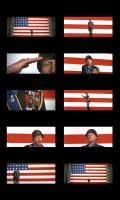
Mateo MatÉ
Thanksgiving turkey
Film expérimental | dv | couleur | 5:30 | Espagne | 2006
Le concept de camouflage s'est répandu dans presque toutes nos activités sociales. Au cours du siècle dernier, les entreprises ont progressivement acquis un pouvoir qui dépasse celui des Etats et ont inventé la science du marketing qui déguise les objets sous l'apparence du rêve : nous utilisons tous les marques comme une seconde peau pour nous intégrer au groupe social auquel nous voulons appartenir. Les produits que nous utilisons ne reflètent pas ce que nous sommes mais ce que nous voulons être ou simplement ce dont nous voulons avoir l'air. Le pouvoir économique s'est emparé du sens du mot vision qui signifiait jusqu'à présent "acte notarié de la vérité". Polyespan, Photoshop et la chirurgie esthétique ont fait de notre environnement un parc à thème où les objets, les messages et les corps sont faux. L'expression "Je ne crois que ce que je vois" ne veut plus rien dire aujourd'hui. Nous continuons pourtant à croire ce que nous voyons parce que nous sommes tous des acteurs évoluant sur la même scène, avec des rôles principaux ou secondaires, mais complices à différents niveaux. Le genre militaire s'est aujourd'hui étendu au niveau social. Les grandes chaînes de prêt-à-porter proposent maintenant des motifs camouflage pour l'école ou le travail, l'immobilier prend des airs de bunkers imprenables ou de kibboutz de "territoires occupés", même les véhicules sont contaminés par l'apparence des véhicules blindés. Avec la militarisation totale de nos frontières qui s'est faites sous prétexte de sécurité, nous sommes tous prêts pour une mobilisation générale. Nous ne savons pas quand et où naîtra le conflit, mais nous devons nous tenir prêt. Dans "Thanksgiving Turkey", un général harangue ses troupes et leurs fournit des instructions détaillées grâce auxquelles les soldats pourront, au cours d'un dîner mémorable, conquérir les invités avec la recette de la délicieuse et magistrale "Thanksgiving Turkey" (dinde de Thanksgiving). Mateo Maté, 2007
MATEO MATÉ Born in Madrid (Spain), 1964. Lives and works in Madrid (Spain) www.mateomate.com m.mate@mateo mate.com SOLO EXHIBITIONS 2007-?Paisajes uniformados?. Centro de Arte de Burgos, CAB. Spain. -?Nacionalismo Doméstico?. Galería Llucià Homs. Barcelona. Spain. -"Thanksgiving Turkey". Galería Trinta, Santiago de Compostela. España. 2006-?Cartografías personales?. Sala CAI Luzán. Zaragoza. Spain. -?Nacionalismo Ibérico?. Fundación Encosta, Lisboa. Portugal. -?Fronteras interiores?. Casa de España, Lima. Perú. 2005 -?Delirios de Grandeza?. Galería Grita Insam. Viena. -?Nacionalismo Doméstico?. Galería Oliva Arauna, Madrid. Spain. 2003 -?Desubicado?. Galería Oliva Arauna. Madrid, Spain. -?Desubicado?. Galerie Six Friedrich & Lisa Ungar, Munich. Germany.
Stephan Mathieu, Mathieu STEPHAN
Catalogue : 2006Radiance | Vidéo expérimentale | dv | couleur | 2:0 | Allemagne | 2005
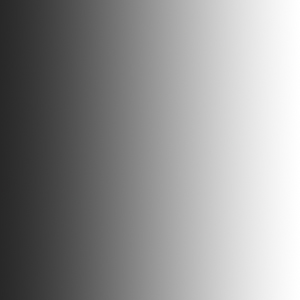
Stephan Mathieu, Mathieu STEPHAN
Radiance
Vidéo expérimentale | dv | couleur | 2:0 | Allemagne | 2005
Un film rapide et sale analogue pour accompagner mon morceau audio "Radiance".
Je suis né en octobre 1967 à Saarbrücken en Allemagne et j?ai passé une bonne partie des années 90 comme batteur professionnel à Berlin. En 1998, je suis retourné à Saarbrücken où je travaille aujourd?hui dans le domaine des arts numériques. Depuis 1999, seize de mes albums musicaux ont été publiés par des labels internationaux. En 2002, le magazine britannique The Wire a voté l?album ²frequencyLib³ parmi les 10 meilleurs albums de musique électronique de l?année. Je crée des installations sonores, graphiques, design et j?ai travaillé comme chargé de cours sur les arts numériques et leur conception à la Royal Academy off Art Göteborg, au Backhaus de Weimar, à la University off Arts and Designs HBKSaar à Saarbrücken et au Merz-akademie de Stuttgart parmi d?autres.
Yuiko Matsuyama
Catalogue : 2006Hana | Film expérimental | 16mm | couleur | 5:30 | Japon | 2004
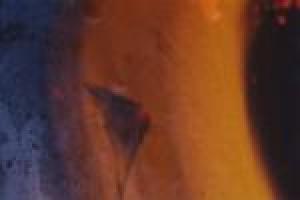
Yuiko Matsuyama
Hana
Film expérimental | 16mm | couleur | 5:30 | Japon | 2004
Dans ce film, Yuiko Matsuyama s'intéresse à la lumière et aux mouvements qui existent à l'échelle microscopique. Elle essaie notamment d'évoquer métaphoriquement une fleur. Pour la réalisation de ce film, elle a procédé à des surimpressions en utilisant la même pellicule à plusieurs reprises. Cette ?uvre réalisée avec de l?encre de Chine est la quatrième d?une série commencée avec Field en 2000.
Yuiko Matsuyama naît en 1972 à Mehime, au Japon. Elle étudie la psychologie sociale à l´école Tsuda et en 1997 commence à réaliser des films. Yuiko vit désormais à Tokyo. Elle fait partie du collectif ISLANDS.
Gordon Matta-clark
Catalogue : 2007Conical intersect | Doc. expérimental | 16mm | noir et blanc | 19:0 | USA, France | 1975
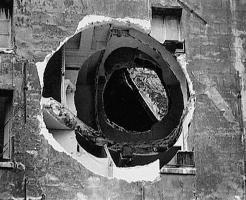
Gordon Matta-clark
Conical intersect
Doc. expérimental | 16mm | noir et blanc | 19:0 | USA, France | 1975
Conical Intersect, la contribution de Matta-Clark à la Biennale de Paris de 1975, manifestait sa critique de l?embourgeoisement urbain sous la forme d?une incision radicale dans deux immeubles adjacents datant du 17ème siècle qui devaient être démolis, non loin du très contesté Centre Georges Pompidou qui était encore en construction à cette époque. Pour cet anti-monument, ou ?nonument?, qui envisageait la poétique de la ruine municipale, Matta-Clark a percé un trou en forme de tornade qui formait une spirale à 45 degrés pour sortir par le toit. Dans l?esprit d?un périscope, le vide offrait aux passants une vue sur les squelettes internes des immeubles.
Gordon Matta-Clark a étudié l?architecture à la Cornell University mais n?a jamais exercé en tant qu?architecte conventionnel. Il a également étudié la littérature française pendant un an à la Sorbonne à Paris et il se trouvait là-bas lors des manifestations étudiantes de Mai 68. C?est à Paris qu?il a découvert les philosophes déconstructionnistes, Guy Debord et les Situationnistes. Ces radicaux, aussi bien sur le plan politique que culturel, ont développé le concept du ?détournement? ou de la ?réutilisation d?éléments artistiques préexistants dans un nouvel ensemble.? Des concepts tels que celui-ci ont inspiré son travail par la suite. On le connaît surtout pour des travaux qui altèrent des structures existantes. Ses ?coupes d?immeubles? (dans lesquelles une maison est coupé en deux sur la hauteur par exemple) altèrent la perception de l?immeuble et de son environnement. Matta-Clark a utilisé bon nombre de media pour décrire son travail, y compris des films, des vidéos et des photos. Son travail comprend des performances et le recyclage de pièces, des travaux sur l?espace et la texture et ses ?coupes d?immeubles?. Matta-Clark utilisait également des calembours et autres jeux de mots pour re-conceptualiser des rôles et des relations pré conditionnées (ce sui était valable dans tous les domaines, allant des relations entre individus à l?architecture). Il a démontré que la théorie de l?entropie s?appliquait au langage aussi bien qu?au monde physique et que le langage n?est pas neutre mais qu?il est bel bien un outil qui porte les valeurs de la société et sert à véhiculer une des idéologies. Matta-Clark est mort d?un cancer du pancréas le 27 août 1978.
Gordon Matta-clark
Catalogue : 2008The Wall (1976-2007) | Art vidéo | 35mm | couleur | 15:4 | USA | 1976

Gordon Matta-clark
The Wall (1976-2007)
Art vidéo | 35mm | couleur | 15:4 | USA | 1976
Cette ?uvre récente est une des rares traces de la performance de Gordon Matta-Clark en 1976 à Berlin. Le film s'ouvre sur le texte suivant : "En 1976, dans le cadre de l'exposition "Soho in Berlin" de l'Akademie der Kunst et de la Berliner Festwochen, Gordon Matta-Clark s'est rendu en Allemagne avec l'intention de faire exploser une section du mur de Berlin. Ses amis l'ayant finalement dissuadé d'entreprendre cette action suicidaire, il a réalisé la performance suivante.". Le film montre l'artiste écrire "Made in America" sur le Mur, coller des publicités sur des graffitis et s'empoigner avec la police. Enregistrement remarquable d'une performance peu connue de Gordon Matta-Clark, cette ?uvre constitue également un témoignage d'un paysage politique et physique aujourd'hui disparu.
Gordon Matta- Clark (New- York 1943- 1978) a étudié la littérature française à la Sorbonne et l'architecture à la Cornell University. À partir du début des années 1970 il a participé à plusieurs projets expositions collectives en tant que co-fondateur avec d'autres artistes du Food Restaurant à Soho (New- York). Ses ?uvres ont été présentées à la Documenta V, Kassel (Allemagne), à la 9e Biennale de Paris et dans des expositions à Sao Paulo, Berlin, Zurich. Certains de ses projets majeurs ont été montés à Aix-la-Chapelle, Paris et Anvers. Après sa mort, des rétrospectives lui ont été consacrées par le Musée d'Art Contemporain de Chicago, le Badischer Kunstverein, Karlsruhe (Allemagne) et IVAM Centro Julio Gonzalez, Valence, Espagne.
Mara Mattuschka
Catalogue : 2010In Transit | Film expérimental | 35mm | couleur | 4:55 | Autriche, Allemagne | 2008
Mara Mattuschka
In Transit
Film expérimental | 35mm | couleur | 4:55 | Autriche, Allemagne | 2008
In Transit À l`entrée des Offices, à Florence, un affichage numérique indique au public faisant la queue le temps d`attente qui lui reste. En pleine saison, cette attente peut durer jusqu`à quatre heures. Or, à peine entrée, la grande majorité des visiteurs s`efforce de passer en revue le plus vite possible les incontournables du musée. Six secondes ? à en croire l`hypothèse initiale de Reinhold Bidner ? est le temps que consacre le visiteur moyen à un tableau. Dans sa vidéo intitulée In Transit, Bidner analyse ce phénomène. Plan d`ouverture : un tableau accroché au mur devant lequel est assis un homme, visiblement en train de se reposer. La caméra fait un lent travelling avant sur le tableau jusqu`à ce que l`espace environnant ait disparu ? et le tableau se met à bouger : le Portrait d`une Jeune Fille de William-Adolphe Bouguereau, grand peintre de l`académisme français, se transforme tour à tour en portrait de la fille de Rubens, puis en Jeune Bacchus malade de Caravage, en Tête de méduse de ce dernier ainsi qu`en une quantité d`autres portraits appartenant au corpus de l`histoire de l`art ? avant que, finalement, le sourire de la jeune fille de Bouguereau ne réapparaisse à l`écran ; la caméra s`éloigne et filme l`environnement, qui a changé. Plan final : une femme qui bâille. Pendant tout ce parcours virtuel du musée flotte sur le tableau un voile de gouttelettes où se reflètent les mouvements des visiteurs, fatigués ou fébriles, du Louvre. Par ce choix formel, Bidner tient le spectateur à distance, tout en instaurant un second niveau : celui du public venu regarder, mais tellement sollicité qu`il ne voit rien. Conjointement avec Richard Eigner qui a élaboré le son croissant et décroissant du film, Reinhold Bidner a réalisé une étude toute en finesse sur le comportement des personnes dans le musée du XXIe siècle. Une étude qui incite le public à poser sur l`art un regard plus dense, plus attentif. (Nina Schedlmayer)
Née en 1973 à Kaboul (Afghanistan), Lida Abdul est retournée habiter dans cette ville. Elle a vécu en Allemagne et en Inde en tant que réfugiée après avoir été forcée de quitter l?Afghanistan alors envahi par l?armée soviétique. Son travaille mêle les tropes du formalisme occidental avec un certain nombre de traditions esthétiques ? islamiques, bouddhistes, indiennes, païennes et nomades ? qui ont influencé l?art et la culture afghans. Elle a réalisé des ?uvres avec différents médiums, notamment a vidéo, le film, la photographie, l?installation et la performance. Son ?uvre la plus récente a été montré dans plusieurs biennales, la Biennale de Venise en 2005, de São Paulo en 2006, de Gwanju en 2006, de Moscou en 2007 et de Sharjah en 2007, ainsi qu?à l?Istanbul Modern, la Kunsthalle de Vienne, l?Ok Centrum, le Museum of Modern Art Arnhem, la Tate Modern, le Moma NY, le National Museum of Kabul, le Netherlands and Miami Central, l?ICA London, le ZKM, le Capc Bordeaux, le CAC Centre d?Art Contemporain de Bretigny, et le Frac Lorraine Metz, France. Cette année, elle aura une exposition solo à l?Indianapolis Museum (IMA) et aux Smithsonian at Sackler galleries.
Peter Maybury
Catalogue : 2026L’esprit de l’escalier | Film expérimental | 4k | couleur | 5:50 | Irlande | 2025
Peter Maybury
L’esprit de l’escalier
Film expérimental | 4k | couleur | 5:50 | Irlande | 2025
L’esprit de l’escalier est le troisième film d’une trilogie consacrée au Pálás, un cinéma de Galway, en Irlande, conçu par Tom dePaor. Ouvert en 2018, le cinéma a fermé au public en février 2025, et j’ai assisté à l’une des dernières projections au Pálás : Goodbye Dragon Inn de Tsai Ming-Liang, lui-même un film sur la fermeture d’une salle de cinéma. Je suis revenu le lendemain matin, ces pensées encore en tête, pour filmer les escaliers qui parcourent le bâtiment. Ces espaces ne sont pas tempérés, à moitié intérieurs, à moitié extérieurs, tandis que les salles de projection, avec leurs intérieurs rouges et feutrés, sont optimisées pour le son, la température et la lumière. Le titre de mon film renvoie à l’expression “avoir l’esprit de l’escalier” (penser à la réplique parfaite trop tard), mais surtout à l’esprit même de l’escalier. Comme dans Goodbye Dragon Inn, tant de vie circule dans ces lieux où les personnes, la météo, la lumière et le son s’entrecroisent, influencent — voire habitent — le mouvement ou l’immobilité de la caméra, jusqu’à ce que l’endroit lui-même devienne un film.
Peter Maybury est un artiste pluridisciplinaire irlandais. Ses recherches fondées sur la pratique couvrent des travaux en tant qu’artiste, graphiste, cinéaste, éditeur, écrivain, rédacteur, commissaire, musicien et enseignant. Il est diplômé de Central Saint Martins, à Londres, et doctorant au Centre for Socially Engaged Practice-Based Research de la TU Dublin. Il a collaboré de manière extensive avec des artistes et des institutions, des éditeurs et des commissaires, sur plus de 200 publications d’art et d’architecture. Peter est un collaborateur de longue date de Tom dePaor, avec qui il réalise des livres, des films et des œuvres pour des expositions. Parmi ses travaux filmiques figurent On being there (2022/23, projeté aux Rencontres Internationales Paris/Berlin 2023/24), Landfall (2020), une installation filmique d’une heure sur double écran, ainsi que, avec dePaor, les films de Gall Drape (2018) et A Study (2015), réalisé pour une exposition à l’ETH Zurich. Peter est l’auteur de Make Ready (2015), et co-auteur avec dePaor de Reservoir (2010) et Of (2012).
Catalogue : 2023On Being There | Film expérimental | 4k | couleur et n&b | 60:0 | Irlande | 2022
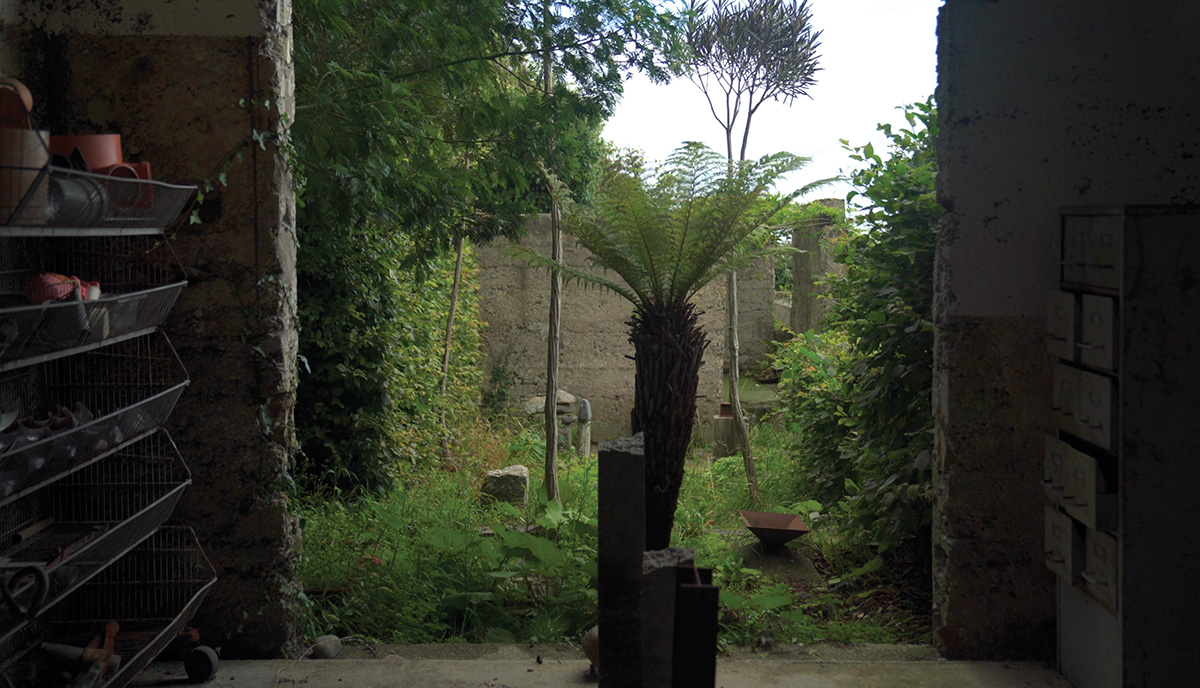
Peter Maybury
On Being There
Film expérimental | 4k | couleur et n&b | 60:0 | Irlande | 2022
On being there is a filmic encounter with the material and outputs of the office of Tom dePaor, drawing on 30 years of practice. There is the place itself. There are notebooks, drawings, prints, scale models, 35mm slides, photographs, films, files, books, writing. A diversity of materials and media, evidencing significant technological changes in production and reproduction. This is the raw material. The film is a rerecording, or sampling of this material, where scale, media, and modes of presentation and realisation merge. The linear transition from drawing to model to built landscape and documentation is disrupted. The film explores the permeability of the image. Animated or activated through movement and operation, everything can be superimposed, overlaid, or cut into. An audio-visual encounter with place, within the space of the screen and the loudspeaker.
Peter Maybury is an Irish multidisciplinary artist. His practice-based research encompasses works as an artist, graphic designer, filmmaker, publisher, writer, editor, curator, musician, and educator. He is a graduate of Central Saint Martins, London, and is a Doctoral Candidate at the Centre for Socially Engaged Practice-Based Research, TU Dublin. He has collaborated extensively with artists and institutions, editors and curators, on more than 200 art and architecture publications. Peter is a longstanding collaborator with Tom dePaor, making books, films, and works for exhibition. His film work includes Landfall (2020), an hour-long dual-screen film installation, and with dePaor the Gall films Drape (2018), and A Study (2015) made for exhibition at ETH Zurich. Peter is author of Make Ready (2015), and co-author with dePaor of Reservoir (2010) and Of (2012).
Iris Mayr
Catalogue : 2007Ars Electronica | 0 | 0 | | 0:0 | Autriche | 2007
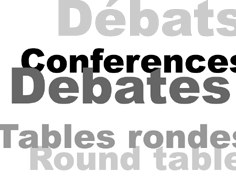
Iris Mayr
Ars Electronica
0 | 0 | | 0:0 | Autriche | 2007
Avec les orientations spécifiques et la continuité qu'il a déployée depuis 1979, Ars Electronica est une plate-forme unique pour les arts digitaux et la culture média organisée en quatre divisions : Ars Electronica ? Festival d'Art, de Technologie et de Société. Le Prix Ars Electronica, Compétition Internationale pour les Arts cybernétiques. Ars Electronica Center- Musée du futur. Ars Electronica Futurelab ? Laboratoire pour les Innovations du futur. Le Festival Ars Electronica. Le Festival Ars Electronica, reconnu au niveau international, est une rencontre interdisciplinaire et ouverte entre experts internationaux en arts et en sciences avec un public large, d'horizons divers, et aux intérêts très différents. Chaque année depuis 1979, le festival se compose de conférences, d'expositions et de performances et d'événements conçus pour approfondir la confrontation scientifique et artistique avec les phénomènes sociaux et culturels qui sont les conséquences du changement technique. http://www.aec.at/en/festival2007/. Le Prix Ars Electronica En tant que compétition d'arts cybernétiques, le Prix Ars Electronica est un forum pour la créativité artistique et l'innovation depuis 1987. C'est le baromètre des tendances dans un monde du média art en constante évolution et de plus en plus diversifié. Du fait de sa fréquence annuelle, de sa visée internationale et de la variété incroyable des ?uvres sélectionnées pour le Prix, les Archives du Prix Ars Electronica permettent un regard précis sur le développement de l'art média et donnent une idée de son ouverture et de sa diversité. http://www.aec.at/en/prix/index.asp?nocache=165093 Le centre Ars Electronica : Le centre Ars Electronica a ouvert en 1996 en tant que prototype du "Musée du Futur". Sa mission est d'utiliser des formes interactives de médiation pour faciliter la rencontre du public avec la réalité virtuelle, les réseaux digitaux et le mlédia moderne. Une attention portée sur les sujets à l'interface du média art, nouvelles technologies et développements sociaux, caractérise les expositions innovantes du Centre. Le Centre Ars Electronica est la base permanente et aussi la structure organisationnelle des activités régionales et internationales d'Ars Electronica. http://www.aec.at/en/center/ Ars Electronica Futurelab: Le Futurelab est un modèle de laboratoire d'un type nouveau pour le média art dans lequel les innovations technologiques et artistiques génèrent une inspiration réciproque. L'équipe du laboratoire rassemble une grande variété d'aptitudes spécialisées, leur approche est caractérisée par l'interdisciplinarité et un travail en réseau international. Les activités multiples du Futurelab vont de l'organisation d'expositions et la création d'installations, à la poursuite d'une recherche en collaboration avec les universités et s'engage dans des partenariats avec des associés des secteurs privés.
Iris Mayr est née en 1971 en Autriche. Elle étudie la science de la communication et l'administration des affaires à Linz, Salzburg et Seville. En 2003 et 2004, elle est assistante de recherche et tutrice à l'Université de Salzburg (Departement de l'Audiovision et de la Communication digitale et le Centre ICT&S). Depuis 1996 elle est membre du Centre Ars Electronica de Linz (Festival Ars Electronica, Production and Curatorial Team). En 2006 elle est conservatrice auprès de Lev Manovich, Yuko Hasegawa et Pili à la Media City_Séoul à Séoul. De 2004 à 2007, elle est l'instigatrice du Prix Ars Electronica ? International Competition for CyberArts et conservatrice culturelle indépendante.
Marko Mäetamm
Catalogue : 2011MUSE | Documentaire | dv | couleur | 3:5 | Estonie | 2009
Marko MÄetamm
MUSE
Documentaire | dv | couleur | 3:5 | Estonie | 2009
She is a sourse of my inspiration. She gives my life a meaning. I am part of her and she is part of me. We can`t live without each other because she gives ideas for my artistic creation.. She is my muse.
Born in 1965 in Viljandi, Estonia. Studied in Estonian Academy of Arts, MA 1995 Lives and works in Tallinn, Estonia. Works with a wide range of media including photography, sculpture, animations, painting and text. Mäetamm tells us the stories which happen behind the closed doors and pulled curtains of the intimate territory we called home. Mäetamm portrays the family as a little society -relaying through a dark humor the petty moments of daily life - and exploring the way our society manipulates the family dynamics through the macrocosms of economy, consumerism, and ?quality-of-life? standards. Inspired by his own private life and the recurrent feeling he could fail to preserve the balance in his existence, Mäetamm?s work explores the grey area where ambiguous feelings of being in control and being controlled merge. Marko Mäetamm has exhibited internationally and represented Estonia at the 52nd Venice Biennial in 2007. Contact: maetamm@yahoo.com HOMEPAGE: www.maetamm.net
Catalogue : 2009CAR RIDE | Animation | dv | couleur | 3:16 | Estonie | 2008
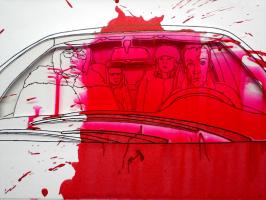
Marko MÄetamm
CAR RIDE
Animation | dv | couleur | 3:16 | Estonie | 2008
Cette ?uvre parle de la façon dont les choses peuvent très souvent sembler différentes de ce qu?elles sont en réalité, et de la façon sont les choses sont absolument différentes de ce qu?elles semblent. Un beau vendredi soir, au début du mois de mars, l?auteur a emmené sa jolie femme et ses deux merveilleux enfants dans leur petite Honda Civic afin d?aller rendre visite à ses parents dans le Sud de l?Estonie...
Marko Mäetamm est né dans la petite ville de Nuia, au sud de l?Estonie. L'idée de devenir artiste lui est subitement venue, comme tombée du ciel, à l?âge de 18 ans. Il a étudié la gravure à l?Académie Estonienne des Arts, où il a obtenu sa licence en 1993 et son master en 1995. Marko Mäetamm a commencé à exposer alors qu?il était encore étudiant. Ses premiers travaux se sont basés essentiellement sur les techniques de gravure après quoi il est passé à la peinture, qu?il trouvait plus directe. À un certain moment, le texte est devenu essentiel dans ses projets. Puis, suivant ses idées, il a commencé à travailler avec les images en mouvement. À l?heure actuelle, Marko Mäetamm travaille en mélangeant différents types de médias. Il fait des photos, des objets, et des animations, il peint et produit des textes et mélange le tout dans ses installations. En 2007, Marko Mäetamm a eu la chance de représenter l?Estonie à la Biennale de Venise (Italie), avec le projet « Loser's Paradise », ce qui a fortement influé sur sa carrière artistique.
Catalogue : 2008FAMILY | Animation | dv | couleur | 4:9 | Estonie | 2007
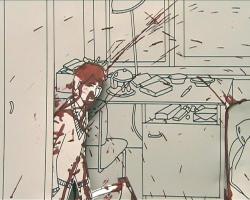
Marko MÄetamm
FAMILY
Animation | dv | couleur | 4:9 | Estonie | 2007
Un homme muni d?une hache court dans son appartement. Il semble être à la poursuite de sa femme et de ses deux enfants. Ces derniers essaient de se cacher derrière le canapé, le lit, le placard ou encore sous la couverture, mais l?homme à la hache parvient toujours à les trouver, et quelque chose se passe. Chaque fois l?homme se voit encore davantage couvert de sang, tandis que la femme et les enfants semblent se porter de mieux en mieux. Et c?est sans fin.
Son travail a été exposé au Pavillon estonien aux 50ème et 52ème Biennale de Venise, au Musée d?art contemporain deTallinn, à la kArton Gallery à Budapest, au centre d?art contemporain Rekalde, à Bilbao, au Musée d?art de Dubrovnik, Croatie, à la Nettie Horn Gallery, Londres, à la KunstRaum de Linz, Autriche, au centre d?art contemporain de Vilnius, Lituanie, à la Pinakothek der Moderne de Munich, au KUMU Art Museum, Tallinn, à la biennale Balticum 2006 au Rauma art museum, au Kunstraum Düsseldorf, Allemagne, au Art Hall et au KUMU art center de Tallinn, à Kiasma, au Musée d?art contemporain d?Helsinki, Finlande, au centre d?art contemporain de Vilnius, Lituanie.